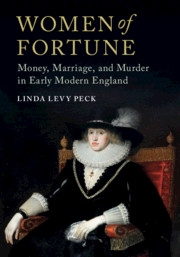'In this exhaustively researched and skillfully presented book, Linda Levy Peck recasts passive heiresses as active wives. Promoting their own ambitions and reshaping the families into which they married, these 'women of fortune' creatively re-energized elite cultures and pushed out theboundaries of female opportunity. Peck rightly and rigorously positions them at the very center of England’s early modern social order.'
Cynthia Herrup - J. R. Hubbard Professor of History Emerita, University of Southern California
'Women of Fortune opens with the grim details of the murder of a noblewoman described by a peer as 'the most sordid person who ever lived …' and then explores a huge web of connection across a whole century and across city, county, and a continent, opening up the economic, social, and cultural dimensions of that web, seen mainly through the eyes of its wonderfully feisty female members. This book is as illuminating as it is evocative.'
John Morrill - Professor Emeritus of British and Irish History, University of Cambridge
'In this important book, Linda Levy Peck traces the fortunes of the descendants of two London apprentices who made good in early seventeenth-century London. The agency and enterprise of women are at the heart of her story, mostly merry widows making and spending money, travelling the continent, although in one unfortunate case, being murdered for their gold by the local butcher. Engaging detail and vivid personalities combine in a compelling account of fundamental transformation over a century and a half - of social mobility, new forms of wealth and credit, and improved opportunities for elite women.'
Ann Hughes - Keele University
'Peck charts the destinies of three generations of the Bennet and Morewood families. Sir Thomas Bennet the elder was the founder of the dynasty, earning a fortune in the cloth trade, enriching himself through Crown finance, and ending as Lord Mayor of London. Like Bennet, Gilbert Morewood was the scion of minor gentry who became a successful merchant and London oligarch. … One learns much about the rationale for arranged marriages, brokers and marriage portions … Peck is particularly effective in showing how female heiresses protected their inheritances, passed them onto their children, and crafted independent identities for themselves. The most compelling section deals with the grisly murder of Grace Bennet the elder, who was killed by a butcher in search of gold allegedly buried on her estate. Portraits of worthies and other reproductions of period art adorn the text.'
D. R. Bisson
Source: Choice
'Levy Peck does a meticulous job of mining her sources, which include family papers, accounts, correspondence, company records, probate, and court documents. What is striking is that the Bennett-Morewood women emerge fully formed from the pages despite the fact that few to none of the sources are in their own words or voices. This book is a primer in how to bring women into a story even when that story was told and dominated by men.'
Amy M. Froide
Source: The Journal of Interdisciplinary History
'Levy Peck’s depth of research is outstanding, including more than twenty archives in the UK and US, bringing to light previously unpublished sources. Where correspondence for her main protagonists is missing, she has reconstructed their activities through financial accounts and lawsuits. Although the book focuses on a small number of elite women, it allows for much broader conclusions to be drawn, about the changing nature of financial opportunity and investment in early modern England, the persistence of elite ties to country and city, and the central role of women in harvesting and protecting property and inheritance for future generations.'
Misha Ewen
Source: Cultural and Social History
‘… this work is enlightening and exciting to read and provides an unusual and striking impression of the changing lives of three generations …’
Margrit Schulte Beerbühl
Source: Historische Zeitschrift
‘This book is a very good read … The author has painted a fascinating picture of this gallery of individuals, whose lives were so different in outcomes and yet had similarities.’
Janette Rutterford
Source: The Economic History Review



